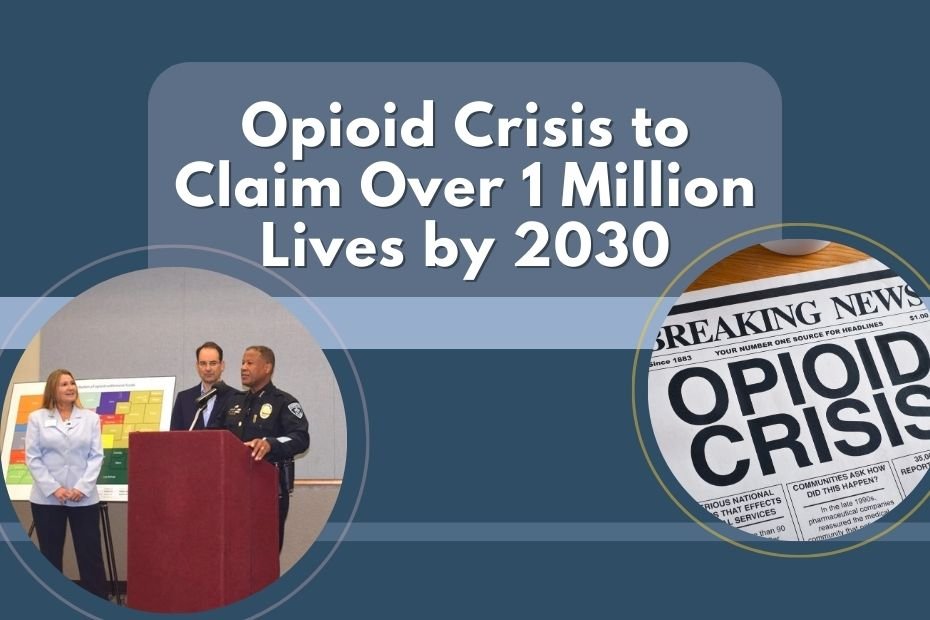A recent study by the Stanford-Lancet Commission on the North American Opioid Crisis, released on February 2, has cast a grim shadow on the future. Without immediate action, a staggering 1.2 million lives could be lost to opioid overdoses in the U.S. and Canada by the decade’s end.

This chilling prediction compounds the tragedy of over 600,000 individuals who have succumbed to opioid-related deaths since 1999.
The Unfolding Catastrophe in Public Health 🌍🩺
The ongoing opioid crisis is a deeply disturbing chapter in contemporary public health. Emerging in the mid-1990s, the crisis was ignited by introduction of the potent drug OxyContin, marketed by Purdue Pharma and endorsed by the Food and Drug Administration (FDA).
This marked the inception of the initial wave of fatalities linked to the use of legally prescribed opioids. Subsequently, a second wave followed, driven by the expansion of the heroin market, ensnaring those already struggling.
More recently, a third wave of casualties emerged due to banned synthetic opioids like fentanyl. Beyond the tragic loss of life, the crisis has inflicted widespread societal afflictions, including homelessness, unemployment, educational disruption, and familial discord.
Pandemic’s Veiled Aggravation and Urgent Need for Solutions 🌐🦠
The pandemic’s emergence has veiled the crisis while exacerbating its impact. Elevated mortality rates can be attributed to the stress and isolation induced by COVID-19, aggravated by the persistent lack of accessible quality healthcare and protection.
As the crisis escalates, the imperative for a swift, comprehensive, and united resolution grows more urgent than ever.
Failures of Oversight and Corporate Influence 👎💼
The crisis has laid bare the failure of controls on multiple fronts. A case in point is the acceptance of OxyContin, where Purdue Pharma’s deceptive claims of its reduced addictive potential were later exposed as false. The pursuit of profit by pharmaceutical corporations is a persistent concern.
Regulatory Gaps and Ethical Concerns 🕵️♂️🧪
Once a drug secures approval, it often falls to the industry, rather than regulators, to educate and guide prescribers on risk assessment and mitigation. The influence of opioid manufacturers on policy-making through donations remains a disconcerting issue.
Instances of regulatory officials transitioning swiftly into the pharmaceutical sector without adequate cooling-off periods further underline the crisis’s systemic nature. The report delves into these and other glaring instances.
Something Special Happened
Painkiller, a drama coming to Netflix on August 10, follows the path of destruction left by the mint green OxyContin pill, from Richard Sackler (Matthew Broderick), the former chairman and president of Purdue Pharma, to the sales reps sent all over the country (Dina Shihabi and West Duchovny), to the average Americans whose lives were changed forever by the drug (Taylor Kitsch).
At the bottom, a determined investigator for the U.S. Attorney’s Office named Edie Flowers (Uzo Aduba) tries to find the source of the subsequent addiction problem. Painkiller is mainly about the key events that led to the opioid problem and how they could have been stopped but weren’t.
At one point, Curtis Wright (Noah Harpster), the one FDA inspector in charge of making sure OxyContin got approved, became a significant problem for Purdue. But Wright would soon sign off on a drug application that said, “OxyContin tablets are thought to make the drug less likely to be abused because they take longer to work.”
With those two words—”is believed”—the false claim would put doctors and patients nationwide at ease. And Wright left the FDA a year after OxyContin was approved. He went to work for Purdue in the end.
Balancing Power and Patient Welfare ⚖️🏥
Recommendations outlined in the report aim to curb the undue influence of the pharmaceutical industry while ensuring comprehensive care for individuals with chronic pain, factoring in benefits and risks. Promoting opioid stewardship, a consortium of safer prescription initiatives led by medical practitioners, is vital to progress.
Holistic Care and Accessible Treatment 🏨🤝
Attention is needed for addiction care gaps. Addiction treatment differs from conventional medicine in reputation, quality, and accessibility. Addiction’s long-term threat requires comprehensive answers beyond short-term treatments and injection financing.
Addiction therapy must be covered by public and private insurance and integrated into mainstream healthcare. Parity mandates for substance use disorder services must be strictly implemented.
Education, Collaboration, and Early Intervention 📚🤝
It is essential to teach professionals about addiction as part of their training and work with the criminal justice system to help people with mental health problems move from jail to care.
Youth Empowerment 👨👩👧👦💪
Protecting against the risks of opioids, tobacco, alcohol, and other drugs starts with early help for children and families, which builds strength and resilience.
Changing the Way 🗣️🔄
The way people talk about addiction has changed in a good way. “Substance use disorder” has replaced the stigmatizing term “substance abuse,” which shows that it is a medical problem. “Recovery” and “relapse” are now more common in the language than critical words like “clean” and “dirty,” which shows a positive change.
How Legislation and Affirmative Action Affect Each Other 📜📈
The Affordable Care Act (ACA) has made a big difference in moving forward. It ensures that private insurance plans cover services for people with drug use disorders as part of their “essential health benefits.” Expanding Medicaid, which pays for many services for people with drug use disorder, has led to fewer deaths from overdoses and more people getting help.
Looking for Redemption 🎉🤗
Recognizing the roughly 25 million people in recovery is a nice thing to do. Their ability to get back in touch with loved ones, give back to society, and find new meaning shows how the human spirit can win. Even though the problems seem overwhelming, there is still hope that things will improve.
- What to Pack for 30-Day Rehab? FREE Checklist - May 30, 2024
- Types of Outpatient Rehab: Difference One Should Know - March 28, 2024
- Truth Behind FMLA: Hidden Hurdles of Alcohol Rehab Leave - March 28, 2024